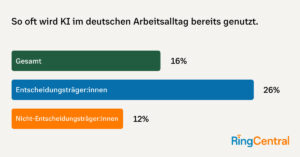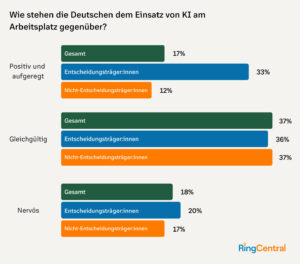
Only around 16 percent of German employees are already using AI-based tools at work. The risk for companies is still low. The majority of respondents are ambivalent about AI.
With services such as ChatGPT and Midjourney, artificial intelligence (AI) has not only made it into the public eye in recent months, but is also continuing its advance into the everyday business and work routine of many employees. However, numerous questions are still unclear in this context: Is the technology already being used across the board in everyday working life, despite all the media hype? Do the currently used AI applications offer real added value from the employees' point of view or are they only used because the managers in the company say so? And last but not least: Employees tend to see the "colleague AI" or the "job killer AI"?
Decision makers are more receptive to AI
RingCentral, provider of cloud-based business communication and collaboration solutions, therefore, in cooperation with the market research company Ipsos, surveyed a total of 1.000 full-time employees aged 21 to 65 in Germany about their attitude towards AI. The results of the survey paint an optimistic, albeit cautious, picture of Germans with regard to their attitude towards AI - and there is also a noticeable difference between the opinions of decision-makers and non-decision-makers in German companies.

🔎 Only around 16 percent of employees in Germany already use AI in their everyday work. (Image: RingCentral)
Only around 16 percent of those surveyed in Germany actually already use AI in their everyday work. It is striking that decision-makers use AI more than twice as often (26 percent) as non-decision-makers (12 percent).
Of those surveyed who already use AI in their daily work, around a third (38 percent) are convinced of the quality of work of AI, while four percent believe the quality is insufficient. Half (51 percent) have mixed feelings about it.
Here, too, the decision-makers are somewhat more positive: 49 percent are convinced of the quality of work of the AI. For non-decision makers, it is only 30 percent.
Confidence yes, enthusiasm no
Looking to the future, 28 percent of respondents (decision makers 37 percent, non-decision makers 25 percent) assume that AI will become even more important for their industry in the future. However, a clear majority of respondents in Germany attributed greater importance to other technologies. These include IT communication tools for meetings, calls and instant messaging as well as cloud computing and 5G technology.
42 percent of those surveyed (decision-makers 61 percent, non-decision-makers 37 percent) are nevertheless convinced that AI and the technological advances associated with it will have a positive impact on the German workforce in general. In particular, younger respondents between 21 and 34 years of age seem optimistic here: More than half (59 percent) expect positive effects.

🔎 37 percent of employees in Germany are indifferent to the use of AI-based tools in the workplace. Only 17 percent are excited in a positive sense. (Image: RingCentral)
However, this confidence does not necessarily translate into actual enthusiasm, as most respondents (37 percent) are indifferent to the use of AI-based tools in the workplace.
Only 17 percent are excited in a positive sense, 18 percent are nervous in a negative sense at the thought.
Again, a difference between positions can be seen here: 33 percent of decision-makers are excited about the use of AI in the workplace, compared to 12 percent of non-decision-makers.
Don't be afraid of the job killer
When it comes to the impact on their own work, the trend is similar: 48 percent of decision-makers are convinced that AI will make their everyday work easier or better, compared to 23 percent of non-decision-makers. It is noteworthy that the majority of respondents are not afraid of AI as a "job killer": Only 18 percent of decision-makers fear that AI will take over their job completely. In the case of non-decision-makers, it is only 13 percent. It is striking here that younger respondents in particular (21 to 34 years) are concerned (24 percent) that they could be replaced by AI.
When looking at their own company, similar tendencies can be seen among those surveyed. 38 percent of non-decision makers (and even 57 percent of decision makers) are convinced that their company has a clear vision of how AI can be used in the future to increase the value of the products and services offered. 56 percent of the decision-makers also confirm that the use of AI in their company would be a positive development for them. This applies to only 30 percent of non-decision-makers.
Conclusion of the survey
“In general, the relationship between German employees and AI is ambivalent. In most cases, the respondents were aware of the importance AI will have both at the macroeconomic and company level and what positive effects its use can have. However, there is hardly any actual enthusiasm for the technology or large-scale use in the here and now,” says Thomas Nicolaus, Country Manager DACH at RingCentral, commenting on the results of the survey.
“I am convinced that this will change in the future. AI is a disruptive technology that will fundamentally change the way we work and will forever shape the employee and customer experience. More and more concrete use cases for AI in the business world will develop to support employees, eliminate repetitive tasks and speed up processes. In customer service, for example, AI can be used as a virtual assistant. In sales, conversational intelligence can support employees in interacting with potential customers by analyzing conversation data and providing recommendations for action to close a deal. Thanks to the insights gained with AI, employees can fully focus on strategic and creative work areas.”
About the Study
On behalf of RingCentral, the US market research company Ipsos surveyed a total of 19.01.2023 full-time employees in Germany between the ages of 31.01.23 and 1.000 using an online study from January 21, 65 to January 5.000, 1.000 on the importance of AI for their everyday work. A total of XNUMX workers worldwide were surveyed, XNUMX each in the following markets: USA, UK, Australia, France and Germany.
More at RingCentral.com
About RingCentral
RingCentral is a leading global provider of cloud-based business communication and collaboration solutions that seamlessly connect telephony, messaging, video meetings and contact centers. RingCentral's solutions are powered by AI-powered conversational intelligence, enabling businesses to gain insights from their own interaction data to accelerate growth. Trusted by millions of customers and thousands of partners around the world, RingCentral has years of experience in providing reliable and secure cloud communications. The company's headquarters are in Belmont, California.
